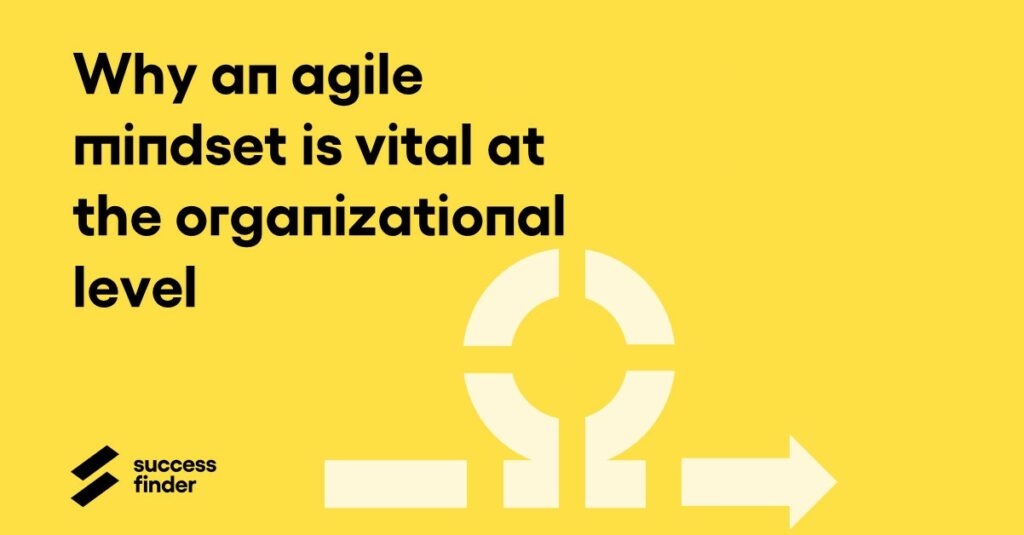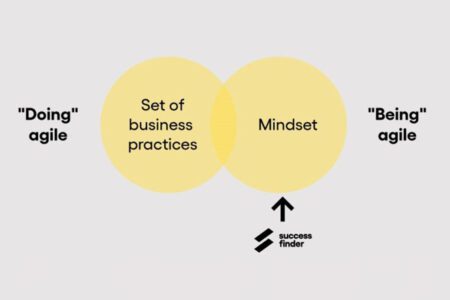If you’ve been paying attention to developments in the business world since the turn of the millennium, you’ve surely heard of Agile methodology, but have you heard of the Agile mindset? If you haven’t, you’ll want to learn about the Agile mindset, because it lies at the heart of an effective implementation of the Agile framework.
The importance of the Agile mindset doesn’t start and end with rank-and-file employees, though. It’s tempting to view things at the individual level when talking about a mindset, but that incomplete view will inevitably hamper your efforts to use the Agile mindset effectively. If you want to make business-level changes, you need to embrace it at the organizational level.
In this post, we’re going to cover why that’s the case. We’ll start by explaining the Agile mindset, note its benefits, detail the traits that support it, and wrap things up by answering the titular question: why is the Agile mindset vital at the organizational level? Let’s get things started.
What is the Agile mindset?
Many companies have attempted to adopt the tools and practices that define the Agile methodology, which promotes adaptive planning and continuous improvement through cross-functional collaboration and flexible development. However, business leaders have found that the methodology alone is not enough. Implementing Agile practices is about doing Agile, but adopting an Agile mindset is about being agile.
We need a definition of Agile mindset before we can proceed further, so here’s my attempt: the Agile mindset values the use of collaboration and personal adaptability to achieve consistent value delivery and maintain an open-minded process of iterative improvement. It’s roughly in keeping with the description listed here, but with a more direct approach.
This obviously isn’t the boilerplate definition, but then no such definition exists because everyone has a different idea of how to frame it. In the end, it makes the most sense to link it directly to the Agile framework, because that’s what it’s all about. Regardless of whether their teams use sprints, people with the Agile mindset communicate readily and always look to streamline things, pursuing SuccessFinder’s core tenets of Agility:
- Adapt and persevere through uncertainty
- Collaborate and consult to make the best decisions
- Prioritize for objectives, not plans
- Recognize the team as the functional unit, not the individual
My background is largely in eCommerce, and it’s a world that changes extremely quickly. The best online merchants know how to defy the norm, whether they’re refreshing their content to meet Google’s latest algorithm updates, building their sites on lesser-known eCommerce software to stand out, stocking unusual products, or adopting novel tones. The worst thing you can do is position yourself behind the curve and be wholly reactive.
"The Agile mindset values the use of collaboration and personal adaptability to achieve consistent value delivery and maintain an open-minded process of iterative."
Rodney Laws
Online Business Consultant and eCommerce Platform Specialist
What are the benefits of the Agile mindset?
Adopting and carrying the Agile mindset is valuable no matter what you’re doing. It encourages you to use resources effectively: asking for help when you need it instead of trying to do everything yourself, and paying close attention to which tactics are most efficient instead of just sticking to whichever options are the most commonly used.
It drives you to keep getting better and push those around you to do the same instead of reaching a certain level of performance and considering it good enough. Vitally, it keeps you working on your skill set to overcome every new challenge you identify — a process that substantially enhances your mental sharpness.
Why is the Agile mindset vital at the organizational level?
I talked about viewing things at the individual level earlier, and that often goes for managers who only think about endorsing certain attitudes. When they want to implement the Agile methodology, they may start by telling everyone to use sprints and be more flexible, but that won’t typically achieve much. Why? Because the right infrastructure needs to be in place.
It’s possible to have a team of employees with the Agile mindset who go about things correctly but can’t make any progress because they’re not given the resources, training, or overarching systems they need to get things done. Consider that it only takes one blocker — often a managerial approach that insists on approving individual actions — to gum up the works.
Due to this, a successful implementation of the Agile framework requires the entire business to adapt accordingly. Teams must be given the practical leeway to run their sprints and learn from the results. Managers must be given appropriate methods for gauging team performance. In short, systems need to change along with attitudes, or else nothing will be achieved.
Wrapping up, the Agile mindset must be applied through tangible changes at the organizational level just as it’s encouraged in individual employees. Only the right mixture of structural and personal adaptation can help grow the Agile mindset within your business and make the most of the Agile methodology.
Which personality traits support the Agile mindset?
Though anyone can start to work towards the Agile mindset, it’s a better fit for some than it is for others. Notably, it calls for a strong critical thinking ability and a great willingness to work with others — the former to keep pushing back against those who’d prefer to stick to old-fashioned business processes, and the latter to support teamwork, which is core to Agility.
If there’s one trait that’s absolutely essential, though, it’s positivity. The Agile mindset is rarely easy. It’s natural to want to settle sometimes, accepting average results to reduce the work required, and it’s natural to get frustrated with the roadblocks that always appear in collaborative projects. If you’re not extremely positive, you’ll struggle to keep going.
SuccessFinder has just finished an empirical study and created a new behavioral benchmark for the Agile Mindset. You can read all about the results in their upcoming Agile Mindset whitepaper or listen to the People Potential with Amanda podcast episode where guest Carolyn Hass, PhD, VP Product and R&D discusses the Agile Mindset behavioral model.
Listen now on your favourite app or site:
About Rodney Laws
Rodney Laws is an ecommerce platform specialist and online business consultant. He’s worked in the ecommerce industry for nearly two decades, helping brands big and small achieve their business goals. For more tips and advice, reach out to Rodney on Twitter @EcomPlatformsio.



